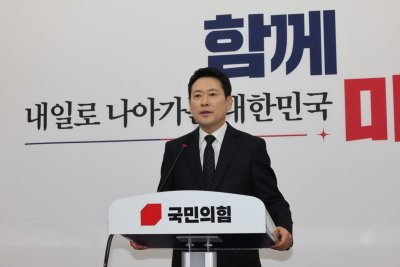PPP denounces raid as ‘opposition crackdown,’ warns of action

Jang Dong-hyeok, leader of the main opposition People Power Party, attends a press conference at the National Assembly in Seoul, South Korea, 20 February 2026. Photo by YONHAP / EPA
Feb. 27 (Asia Today) — The People Power Party on Thursday condemned a joint prosecutors-police raid on its headquarters as a politically motivated investigation and warned it could resort to what it called “extraordinary measures.”
The joint investigation team earlier in the day searched the party’s central office in Yeouido and a company managing its membership list as part of a probe into allegations that members of the religious group Shincheonji were improperly enrolled as party members during the 2021 presidential primary.
According to reports, the warrant cited alleged violations of the Political Parties Act and obstruction of business.
In a statement, senior party spokesperson Park Sung-hoon called the search “a targeted investigation against the main opposition party,” alleging it was intended to deflect criticism over the ruling party’s handling of controversial judicial reform bills.
“This is blatant oppression of the opposition,” Park said, accusing investigative agencies of acting as “shields for those in power while wielding swords against the opposition.”
Party lawmakers also questioned why other allegations involving figures linked to the ruling camp had not seen similar investigative momentum.
Rep. Joo Jin-woo cited bribery allegations involving former Oceans Minister Jeon Jae-soo, claiming the joint team was prioritizing action against the opposition while sidelining probes into ruling party figures. He called for the immediate appointment of a special prosecutor.
Rep. Jin Jong-oh urged authorities to apply the same investigative standards to the ruling Democratic Party, while floor leader Song Eon-seok described the situation as “suppression and annihilation of the opposition,” warning that the party would mobilize “extraordinary measures” in response.
Following news of the search, party leader Jang Dong-hyuk and other senior officials went to the headquarters to review the warrant with legal advisers and discuss countermeasures.
The investigation centers on claims that Shincheonji officials directed followers to register as responsible party members during the 2021 primary process. Authorities have not publicly detailed specific findings.
— Reported by Asia Today; translated by UPI
© Asia Today. Unauthorized reproduction or redistribution prohibited.
Original Korean report: https://www.asiatoday.co.kr/kn/view.php?key=20260227010008383


